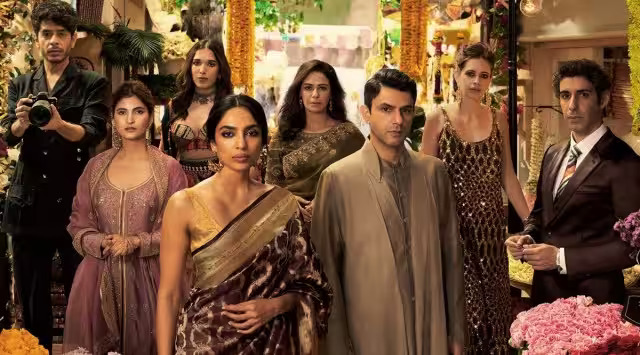[ad_1]
Zoya Akhtar’s Made in Heaven, whose second season premiered on August 10, tackles complex intersections, including the portrayal of a Dalit-Buddhist wedding and trans woman. However, there are legitimate questions raised about the authenticity of the representation particularly concerning caste, gender and sexuality. The critique extends to the casting choice for a Dalit character and the storyline therein, of a trans woman, the fact that a straight man is playing a gay man’s role, etc. These highlight the intricate complexities of speaking to issues of caste, gender, and sexuality in mainstream media.
Director Neeraj Ghaywan takes a pioneering approach to Hindi-Bollywood cinema by showcasing a Buddhist wedding and figures like Buddha and Babasaheb. Watching the episode, my heart skipped a beat. The main character, Pallavi, says, “I want a Dalit marriage”.

The use of the term “Dalit marriage” raises concerns, though. Dalit identity is not a monolith, nor is the experience of various Dalit communities. According to Dalit feminist Shailja Paik, “Dalitness” is not a uniform category. It has complexities that cannot be addressed through binaries (Paik,2021). It is enmeshed in multiple layers — of identity, caste, gender, sexuality, and Brahminical patriarchy. There is no “Dalit marriage” custom. Either it is a Dalit person’s wedding, two Dalits marrying each other and performing Dalit-Hindu rituals, the marriage of a Dalit Christian with Christian rituals, or the marriage of a Dalit with Buddhist rituals.
There are many Buddhist Ambedkarites who deny the category of Dalit; they embrace the identity of Buddhist Ambedkarite and follow the rituals offered by Babasaheb Ambedkar’s Navayana Buddhism.
Made in Heaven 2 is made for an upper-class, upper-caste audience, using marriage as a tool to reflect the complexities of an elite society. Many Dalit people live in chawls, slums, and bastis. Very few have been able to climb the economic ladder. The episode, then, seems an attempt to show upper-class audiences how Dalit women bear the double burden of the caste system and patriarchy.
The term “Dalit marriage” has been used repeatedly. Buddha and Babasaheb’s portraits accompany visuals of Buddhist monks performing rituals. It is a significant misrepresentation in the mainstream. Dalit communities have embraced different types of alternative marriage rituals such as self-respect marriages and Satyashodhak marriages. Satyashodhak marriages were started by Mahatma Jyotiba Phule. The goal of the Satyashodhak marriages lies in anti-caste philosophy. The goal of Buddhist and Satyashodhak marriages is to promote equality and liberation.
It is evident that the majority of the characters are played by actors who belong to a specific caste or class. This oversight underscores the need to address diverse experiences and perspectives. Pallavi’s character is based on lived experience and yet a Dalit actor was not given the role. The choice to cast Radhika Apte comes from her Maharashtrian identity. Class seems to be a prominent factor in the selection of actors. The broader trend in mainstream Bollywood of casting upper-caste actors in lead roles underlines the dearth of Dalit representation. Casting Dalit actors in substantial roles would help promote inclusivity and break caste-based barriers in the industry.
Turning to the representation of transgender individuals, the character Meher is portrayed by Trinetra Haldar Gummaraju. She was recently recognised by Forbes under their influential 30 under 30 category. As a doctor and actor, Trinetra’s portrayal of a trans woman is a commendable choice, aligning with the character’s gender identity. However, this portrayal also reopens discussions about the intersections of caste, gender, and sexual orientation within the LGBTQIA+ community. Trinetra seemed to fit the English-speaking, metropolitan character well. Nonetheless, the series overlooks the concerns of trans activists who are advocating for the fundamental rights of trans individuals. Moreover, the show does not address the issues faced by trans individuals from Dalit communities, who navigate distinct challenges.
The series addresses crucial topics such as women’s rights, survival following domestic violence, and the psychological effects it has on children. Bulbul embodies the aftermath of domestic violence and its enduring impact on her children’s mental well-being. Her revelation about her first husband’s cruelty and its lasting effects on their son communicates the lasting impact trauma has. During a child’s formative years, a complex interplay of biological, environmental, and societal factors significantly shapes their development (Firestone, 1985; Shapiro, 2000). These multifaceted influences give rise to defence mechanisms, responses that arise in children as they navigate these dynamics. The effects on children’s lives result from both circumstantial and relational forces. Factors like rejection, frustration, and separation have far-reaching effects on their psychological landscape. These mechanisms serve as adaptive tools to manage challenges within their environment. Recognising the intrinsic interplay between these forces is essential to understanding childhood.
Most Read
Karan, one of the protagonists, is played by Arjun Mathur. Unlike the character, the actor is not gay. Again, this brings into focus the question of the authenticity of the role and representation of gender and sexual minorities. After saving Shahnaz’s life, Karan becomes a catalyst, inspiring her to fight for equality and justice as an autonomous woman. The episode revolved around minority women’s rights, dignity, and autonomy over their children, which is fitting in the context of the ongoing legal dialogue in India.
A central takeaway from the series is the importance of recognising the vulnerability and privilege associated with caste, gender, and sexuality, even within the broader context of queer and trans movements. The series must be applauded for its ambitious effort to tackle an array of societal issues, ranging from polygamy to domestic violence and homophobia. However, it’s crucial to acknowledge that the depth and breadth of these issues cannot be fully encapsulated within a single series; they demand ongoing and sustained efforts to create a meaningful and lasting impact.
Boywad holds a master’s in Gender Studies and is the first Dalit woman chairperson of the Student Council 2019-20 at TISS
[ad_2]
If you want to register your marriage in thane visit : https://marriageregistrationthane.com/court-marriage-registration-in-thane
Source link



